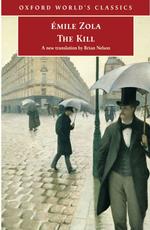
The Kill. Emile Zola
The Kill (La Curée) is the second book in the Rougon-Macquart series of 20 novels that traces 4 generations of a family with a book about each family member. You don't have to read the other books to read one since each stands on its own, but once you start, you may, like me, never be able to stop.
This new translation really helps bring this book to life for the modern reader. Most of Zola's novels were translated when written over a hundred years ago. These original translations are usually the only choice English-language readers have. While good, they are somewhat dated, and a new translation of a Zola novel is an event of great importance. Arthur Goldhammer does a wonderful job of both being true to the time it was written and yet sensitive to the modern reader. There are occasional footnotes to explain some terms, but they are not bothersome nor do they interupt the flow of the work.
In The Kill Zola takes the reader to the Paris of the Second Empire where Napoleon III is transforming the city into a modern marvel. Large, wide, straight new boulevards are being built to provide access to the the heart of the city.
Many people are getting rich in real estate speculation. The protagonist Aristide Saccard, has come to Paris to make a fortune for himself. He knows he can do it if he could just find someone to provide him money to get started. He hears of a rich daughter who needs a husband since she was raped and is pregnant, and strikes a deal with her and her family for a marriage of convenience. With the money he gets from marrying Renée Saccard, he builds a fortune on shady deals and speculation.
Renée is a bored sensualist who takes lovers and attends all the parties she can. She is left to raise Aristide's teenage son, Maxime, another sensualist, who today might be called a Metrosexual. Together, the two explore the sexually liberated world of 19th century Paris and eventually become lovers.
Character development and portrayal are excellent in The Kill. Zola shows us the inner workings of this amoral family and the world in which they travel. Although the ending is a bit weak, the characters and plot are excellently developed.
This is the second time I have read this book and I love the new translation. Not Zola's best work, but a very strong novel worth reading.
No comments:
Post a Comment